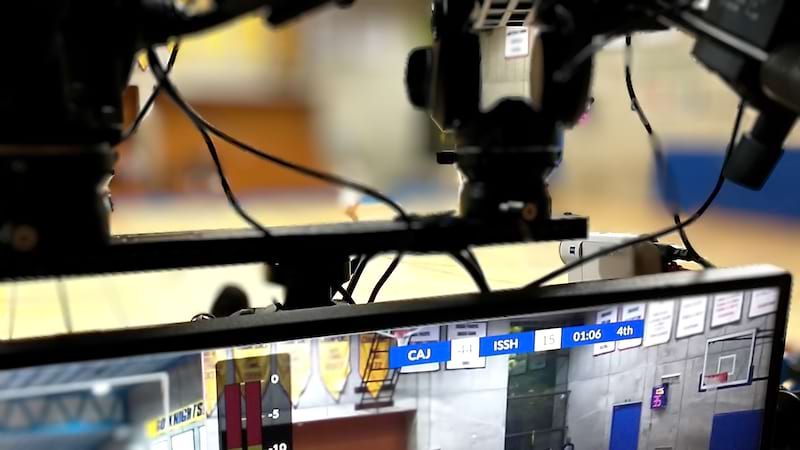8 releases (4 breaking)
| 0.5.0 | Feb 1, 2025 |
|---|---|
| 0.4.0 | Dec 1, 2024 |
| 0.3.1 | Jul 11, 2024 |
| 0.2.2 | Jul 9, 2024 |
| 0.1.0 | Jul 6, 2024 |
#168 in Asynchronous
1.5MB
17K
SLoC
Daktronics All Sport 5000 for Rust
Easily decode the serial output of a console and optionally serialize it.

A Rust implementation of decoders for the Daktronics All Sport 5000's serial output. Please see the documentation for more help.
daktronics-allsport-5000-rs is the most complete library for decoding Daktronics' All Sport 5000 console's serial output in real-time.
This is a Rust library and thus can be installed using Cargo, the Rust package manager. However, a standalone binary is under development for integration in non-Rust workflows.
Note
If you use this crate: let me know about your use case by creating a GitHub discussion or starring! It also lets me know other people find this crate interesting and useful.
Installation
Add this to your Cargo.toml:
daktronics-allsport-5000 = "0.4.0"
Or if you want to use the serde feature:
daktronics-allsport-5000 = { version = "0.4.0", features = ["serde"] }
Or do it with the CLI:
cargo add daktronics-allsport-5000
Cargo features
- Default features:
tokio-serial tokio-serial: Enables support for serial communication using thetokio-serialcrate.tokio: Enables asynchronous support using thetokiocrate.async: Enables support for asynchronous programming, which as of right now only works with Tokio.serde: Enables serialization support of sports using theserdecrate.
Where is this used?
I made this crate to use in another project I'm working on,
daktronics-singular-ui
(also open source on GitHub), which allows producers to link together Daktronics
All Sport 5000 controllers with a Singular.Live overlay in real time.
This powers overlays for
Christian Academy in Japan sports livestreams.
Usage
High-level access
Create a new RTDState instance with RTDState::from_serial_stream (available
with default features enabled). Get the SerialStream with tokio_serial::new
then open_native_async. Check out the examples for more help.
If you need any help, there should be more extensive documentation for each item at docs.rs. Don't hesitate to create a GitHub issue if something is unclear, either.
Sports
This crate supports all sports the control console supports. For a list of them,
see the
sports
module documentation.
Example: getting a sport-specific field
use daktronics_allsport_5000::{
RTDState,
// there are lots of other sports available in their respective modules
sports::basketball::BasketballSport
};
use tokio_serial::SerialPortBuilderExt; // for open_native_async
use crate::daktronics_allsport_5000::sports::Sport; // for rtd_state
#[tokio::main]
async fn main() {
let serial_stream = tokio_serial::new("/dev/ttyUSB0", 19200)
.parity(tokio_serial::Parity::None)
.open_native_async()
.unwrap();
let rtd_state = RTDState::from_serial_stream(serial_stream, true).unwrap();
let mut basketball = BasketballSport::new(rtd_state);
loop {
// get the underlying rtd_state to update it
let update_result = basketball.rtd_state().update_async().await.unwrap();
basketball.main_clock_time(); // -> Result<&str, ...>
}
}
Low-level access
When used with the tokio feature, this package provides a tokio-util codec
implementing Decoder to decode packets from a serial stream from the control
console. That is used internally in SerialStreamDataSource to route data into
RTDState.
If you're not using tokio or you're not using a serial stream to deliver the
data (e.g. using UDP), you must get the packets somehow yourself, but after
that, you can use daktronics_allsport_5000::packet::Packet's
TryFrom<bytes::Bytes> implementation to parse the packet into a readable
format. Then, you can provide that to the main RTDState struct by implementing
daktronics_allsport_5000::rtd_state::data_source::RTDStateDataSource then
giving that to RTDState::new. After that, everything works as normal.
Inspiration
The same concept as this crate is also implemented in Python by @FlantasticDan, C# by @JimThatcher, and Python again by @fimion. In fact, the data in this crate is extracted from a PDF provided by @fimion, so thank you!
The offsets of the various fields have been processed from a PDF and typed by
hand. If you're interested in porting this crate to another language, check out
the Excel spreadsheet I compiled with the data that underpins this crate in
./sports_data.
Given that this protocol is technically proprietary, please note that this crate does not come with any warranty. For more details, see the license.
Dependencies
~6–15MB
~174K SLoC